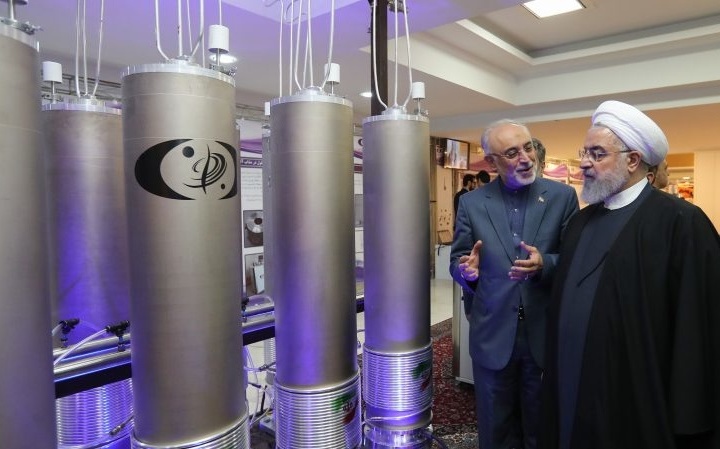President Hassan Rouhani (R) and the head of Iran’s Atomic Energy Organization Ali Akbar Salehi inspecting a nuclear plant, Tehran, April 9, 2019
Iran has announced that it is breaking the 2015 nuclear deal’s limit of 3.67% enriched uranium.
Deputy Foreign Minister Abbas Araqchi and Behrouz Kamalvandi, the spokesman for the Atomic Energy Organization, confirmed the step in a joint news conference on Sunday.
The move was expected. On Wednesday, President Hassan Rouhani said Iran would take the “next step” after breaching the agreement’s restriction of 300 kg (660 pounds) of 3.67% uranium. On Friday, the Supreme Leader’s top foreign policy aide, Ali Akbar Velayati, said “a 5% purity is needed”, saying the uranium will be used for the Bushehr nuclear reactor.
Iran Daily, July 6: Tehran — We’ll Step Up Enriched Uranium to 5%
In May, President Hassan Rouhani set a July 7 deadline for Europe to establish economic links with Iran, bypassing the comprehensive US sanctions crippling the economy, or Tehran would begin suspension of commitments.
On Monday, Foreign Minister Mohammad Javad Zarif announced Iran’s surpassing the limit on stock of 3.67% uranium. At a Wednesday Cabinet meeting, Rouhani said construction will resume on the Arak heavy-water reactor, development of which was halted under the JCPOA until a redesign ensured there was no plutonium by-product which could be put to military use.
The Iranian measures are still well short of returning to the production of 20% uranium — which potentially can be further enriched to more than 90% for nuclear warheads — that it pursued before the 2015 deal with the 5+1 Powers (US, UK, France, Germany, China, and Russia).
Kamalvandi said on Sunday that no decision has been taken on the level of enrichment for the Tehran Research Reactor, which has used 20% uranium for medical isotopes.
Araqchi complained again that the Europeans had not met Iran’s demands over the mechanism, a Special Purpose Vehicle known as INSTEX, for non-dollar trade to bypass US sanctions.
The European Union launched INSTEX in February for limited non-dollar trade in Iranian oil and other commodities and goods. Tehran rejected the mechanism because of “humiliating conditions” such as the EU’s concern over Iran’s missile program, activities in the Middle East, and alleged involvement in assassination and bomb plots in Europe.
After talks in Vienna on June 28, Araqchi said talks were “still not enough and not meeting Iran’s expectations”. On Sunday, he said the negotiations could still produce results.

